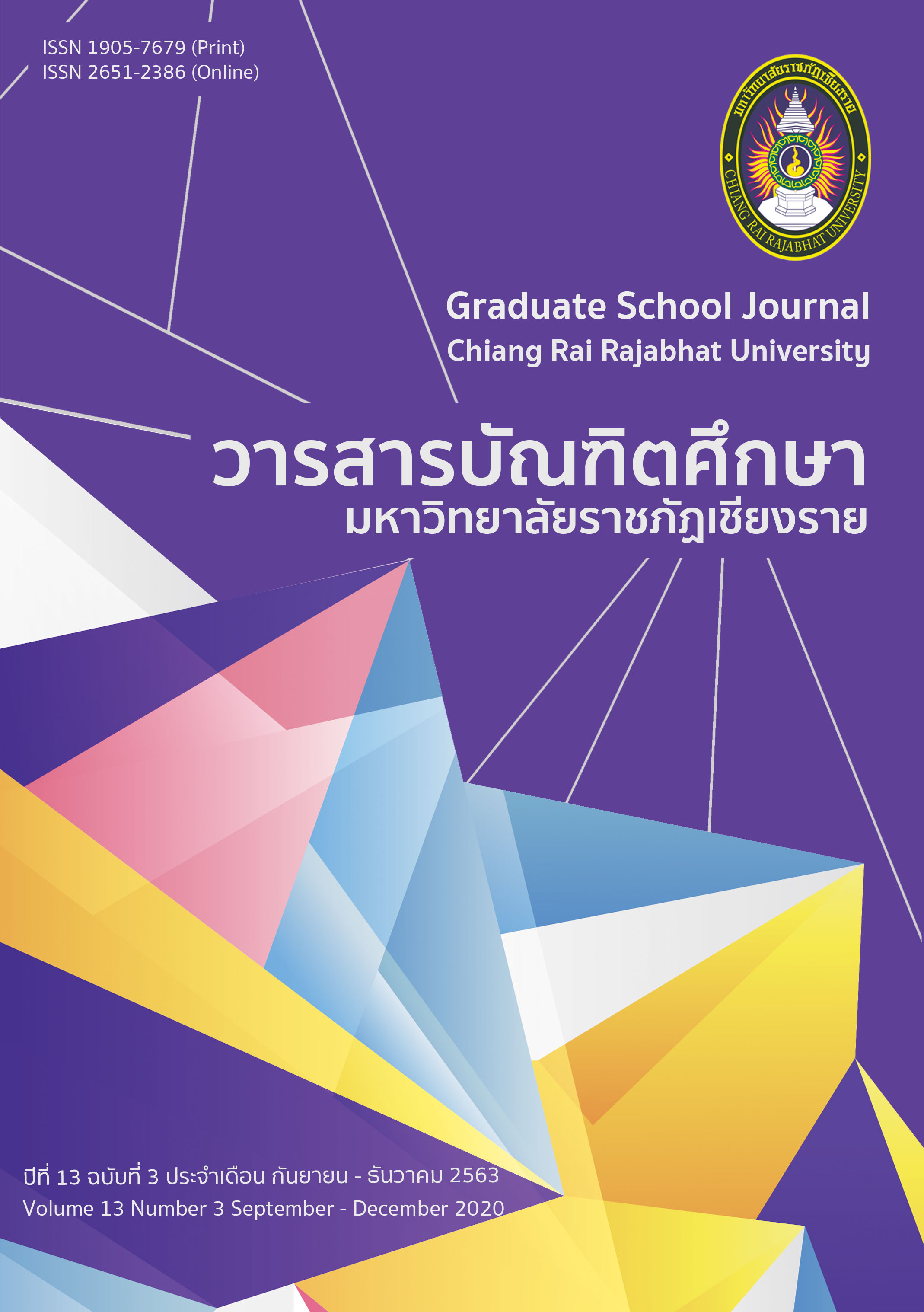การพัฒนาชุดกิจกรรมที่เน้นกลวิธี SQ4R เพื่อส่งเสริมทักษะการอ่านภาษาจีน และทักษะการคิดแบบอภิปัญญาของนักเรียนชั้นมัธยมศึกษาปีที่ 5
Main Article Content
บทคัดย่อ
การวิจัยครั้งนี้มีวัตถุประสงค์ ดังนี้ 1) พัฒนาชุดกิจกรรมที่เน้นกลวิธี SQ4R เพื่อส่งเสริมทักษะ การอ่านภาษาจีนและทักษะการคิดแบบอภิปัญญาของนักเรียนชั้นมัธยมศึกษาปีที่ 5 2) ศึกษาทักษะการอ่านภาษาจีนของนักเรียนที่ได้รับการเรียนรู้โดยใช้ชุดกิจกรรมที่เน้นกลวิธี SQ4R 3) ศึกษา การควบคุมกำกับการรู้คิดในขณะอ่านของนักเรียน และ 4) ศึกษาความสามารถการตั้งคำถามระดับสูง ของนักเรียนโดยใช้ชุดกิจกรรมที่เน้นกลวิธี SQ4R
กลุ่มตัวอย่างที่ใช้ในการวิจัยครั้งนี้ ได้แก่ นักเรียนที่เรียนแผนการเรียนศิลป์ภาษาจีน ชั้นมัธยมศึกษาปีที่ 5 โรงเรียนเรยีนาเชลีวิทยาลัย อำเภอเมือง จังหวัดเชียงใหม่ ซึ่งกำลังศึกษาอยู่ในภาคเรียนที่ 2 ปีการศึกษา 2562 จำนวน 20 คน โดยการเลือกตัวอย่างแบบกลุ่ม (Cluster Sampling) เครื่องมือที่ใช้ในการวิจัยได้แก่ 1) ชุดกิจกรรมที่เน้นกลวิธี SQ4R เพื่อส่งเสริมทักษะการอ่านภาษาจีน และทักษะการคิดแบบอภิปัญญาของนักเรียนชั้นมัธยมศึกษาปีที่ 5 2) แบบวัดทักษะการอ่าน ภาษาจีนแบบอัตนัย 3) แบบประเมินพฤติกรรมตนเองสำหรับนักเรียนเกี่ยวกับการแสดงออกถึง การควบคุมกำกับการรู้คิดในขณะอ่านระหว่างปฏิบัติตามขั้นตอนการเรียนรู้จากชุดกิจกรรมที่เน้น กลวิธี SQ4R และ 4) แบบวัดความสามารถของนักเรียนในการตั้งคำถามระดับสูงและตอบคำถาม โดยกำหนดเกณฑ์คุณภาพรูบริคส์ ทำการวิเคราะห์ข้อมูลโดยหาค่าเฉลี่ย () ของคะแนนและค่าส่วนเบี่ยงเบนมาตรฐาน (S.D.) ทำการทดสอบสมมติฐานโดยใช้สถิติ t-test (Paired Test) ด้วยโปรแกรมคอมพิวเตอร์สำเร็จรูป
ผลการวิจัยปรากฏว่า ชุดกิจกรรมมีประสิทธิภาพเท่ากับ 78.03/88.61 สูงกว่าเกณฑ์ที่กำหนดไว้ 75/75 นักเรียนกลุ่มตัวอย่างมีคะแนนเฉลี่ยหลังการเรียนรู้สูงกว่าก่อนการเรียนรู้อย่างมีนัยสำคัญทาง สถิติที่ระดับ .05 ทักษะการคิดแบบอภิปัญญาด้านการควบคุมกำกับการรู้คิด มีคะแนนเฉลี่ยเท่ากับ 33 แปลความหมายว่า นักเรียนกลุ่มตัวอย่างมีการปฏิบัติตามขั้นตอนในชุดกิจกรรมระดับดี และทักษะการคิดแบบอภิปัญญาด้านความสามารถในการตั้งคำถามระดับสูง มีคะแนนเฉลี่ย เท่ากับ 3.00 แปลความหมายว่า นักเรียนกลุ่มตัวอย่างมีความสามารถในการตั้งคำถามระดับสูงอยู่ในระดับ ดีมาก
Article Details
บทความที่ได้รับการตีพิมพ์เป็นลิขสิทธิ์ของวารสารมหาวิทยาลัยราชภัฎเชียงราย
ข้อความที่ปรากฏในบทความแต่ละเรื่องในวารสารวิชาการเล่มนี้เป็นความคิดเห็นส่วนตัวของผู้เขียนแต่ละท่านไม่เกี่ยวข้องกับมหาวิทยาลัยราชภัฎเชียงราย และคณาจารย์ท่านอื่นๆในมหาวิทยาลัยฯ แต่อย่างใด ความรับผิดชอบองค์ประกอบทั้งหมดของบทความแต่ละเรื่องเป็นของผู้เขียนแต่ละท่าน หากมีความผิดพลาดใดๆ ผู้เขียนแต่ละท่านจะรับผิดชอบบทความของตนเองแต่ผู้เดียว
เอกสารอ้างอิง
นริศ วศินานนท์. (ตุลาคม–ธันวาคม 2559). การศึกษาสภาพการจัดการเรียนการสอนภาษาจีนระดับอุดมศึกษาในประเทศไทย. วารสารจีนศึกษา, มหาวิทยาลัยเกษตรศาสตร์, 9(2), สืบค้น วันที่ 10 สิงหาคม 2562 จาก https://www.tci- thaijo.org/index.php/CSJ/ article/view/98162
นิจพร จันทรดี, โสภี อุ่นทะยา และ ธนานันท์ ตรงดี. (มกราคม–มิถุนายน 2558). การพัฒนาแผนการจัดการเรียนรู้การอ่านภาษาจีนเพื่อความเข้าใจด้วยรูปแบบการจัดกิจกรรมการเรียนรู้ของฮันเตอร์สำหรับนักเรียนชั้นมัธยมศึกษาปีที่ 6. วารสารช่อพะยอม, 26(1), สืบค้นวันที่ 14 สิงหาคม 2562จาก https://www.tci- thaijo.org/index.php/ejChophayom/article/view/36927
บัวลักษณ์ เพชรงาม. (2559). การพัฒนาการอ่านจับใจความของนักเรียนชั้นมัธยมศึกษาปีที่ 6 โดยใช้วิธีการสอนอ่านแบบ SQ4R โรงเรียนสาธิตมหาวิทยาลัยราชภัฏสวนสุนันทา. กรุงเทพฯ: มหาวิทยาลัยราชภัฏสวนสุนันทา.
มยุรี นางาม, สมชาย วรกิจเกษมสกุล และ พัดตาวัน นาใจแก้ว. (2556). ผลการเรียนรู้แบบ เอส คิว โฟร์ อาร์ เสริมด้วยแผนผังความคิดต่อยอดความสามารถในการอ่านภาษาไทยเพื่อทำความเข้าใจและการวิเคราะห์ของนักเรียนชั้นมัธยมศึกษาปีที่ 2. (วิทยานิพนธ์ครุศาสตร มหาบัณฑิต). มหาวิทยาลัยราชภัฏอุดรธานี. สืบค้นวันที่ 10 สิงหาคม 2562 จาก https:// gsbooks.gs.kku.ac.th/56/ grc14/files/hmo18.pdf
วราวรรณ จันทรนุวงศ์ และกิ่งฟ้า สินธุวงศ์. (2557). การคิดและการคิดเกี่ยวกับการรู้ แนวการจัดการเรียนรู้เพื่อพัฒนาการคิดของผู้เรียน. (พิมพ์ครั้งที่1). ขอนแก่น: โรงพิมพ์คลังนานาวิทยา.
สำนักวิชาการและมาตรฐานการศึกษา กระทรวงศึกษาธิการ. (2551). ตัวชี้วัดและสาระการเรียนรู้ภาษาจีน ตามหลักสูตรแกนกลางการศึกษาขั้นพื้นฐาน พุทธศักราช 2551 กลุ่มสาระการเรียนรู้ภาษาต่างประเทศ.กรุงเทพฯ: โรงพิมพ์คุรุสภาลาดพร้าว.
Coon Dennis, Mitterer John O and Martini Tanya. (2016). Psychology modules for active learning. Canada: Cengage Learning.
Israel Susan E, Block Cathy Collins, Bauserman et al. (2005). Metacognition in literacy learning. New Jersey: Lawrence Erlbaum Associates.
Markman Ellen M. (September 1977). Realizing that you don't understand. A preliminary investigation. Child development, 48(3), Retrieved 18 August 2019 from https://www.jstor.org/stable/1128350? seq=1#metadata_info_tab_contents
Wong Linda. (2015). Essential study skills. USA: WADSWORTH CENGAGE Learning.


